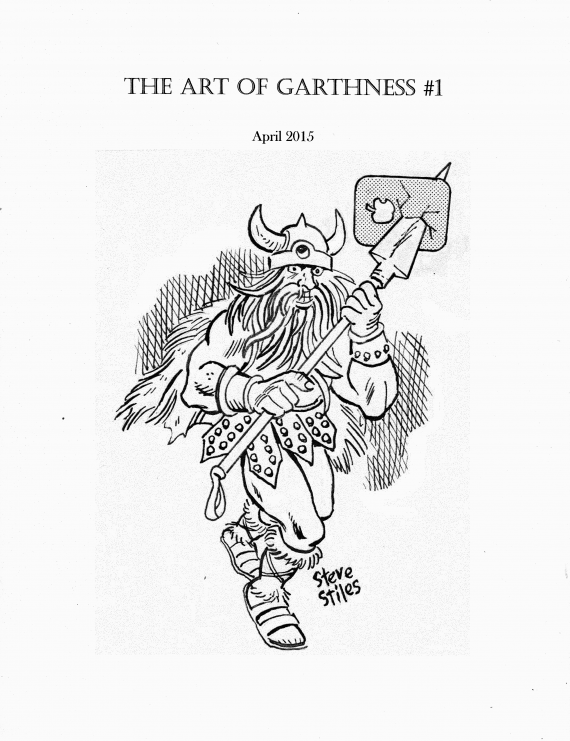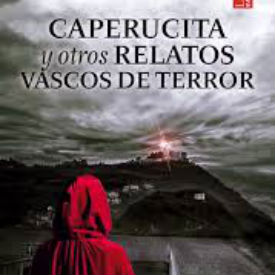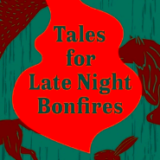Fanzines reviewed: THE ART OF GARTHNESS (#1), and NOWHERE FAN (#3).
(Please note: Zine reviews are normally prepared a week or more in advance of publication of this column and may not necessarily include the latest issue available, but the link to multiple issues given at the bottom of each review probably does.)

The Art of Garthness (#1) – April 2015 – Find it here
Faned: Garth Spencer. Canadian Perzine.
The title says it all. This is an intensely personal zine expressing Garth’s take on the world at large, his place in it, and what it all means, should mean, or could mean.
I am perhaps the last person to consult in the quest to understand what he’s getting at in his writings. I approach life with a sledge hammer, he with a set of precision tools. I question reality as if suffering from perpetual migraine (wearing blinkers, ear plugs and trying to keep things as quiet and dark as possible), and he with a brain soaked with caffeine (as it were) focused on the subject with a pitilessly brilliant spotlight throwing everything into relief in stark contrasts of black and white. I use exaggerated analogy and metaphor, he employs clarity and simplicity.
Fact is we’ve been jousting for nigh on three decades or more. Total opposites in philosophy (which is in itself probably an example of my propensity for exaggeration). We have in common a wry and dry sense of humour (his possibly dryer than mine), and an insatiable curiosity, but otherwise are at loggerheads. Well no, we have something else in common. We’re the sort Pontius Pilate would tell to shut up and leave him alone. Truth was a source of amusement for the Romans, one of those crazy Greek concepts, and certainly not worth arguing about as Garth and I are wont to do.
To explain: here is my take on Garth, never mind the world.
When he was at university in the 1970s he studied the precise meaning and usage of words (there’s a word for that but of course I don’t know it), and how to use formal logic.
I, of course, considering my take on life, the universe and everything, would argue that his courses ill prepared him for a world in which everybody uses words according to what they think they mean as opposed to what they actually mean (indeed, often use words to disguise what they’re saying—language as deliberate misdirection to prevent people from understanding what is actually going on), and ill prepared him for a world where formal logic is mostly unknown and largely irrelevant.
Garth is constantly attempting to use language and logic to understand, explain, and perhaps tame the world, whereas I employ the powers of my intellect (if any) to keep the world at arm’s length while I try to figure out how to exploit it for my own amusement. Garth is a bit of a crusader, though he fancies himself a court jester. Me? I’m a court jester who fancies himself a bit of a crusader.
There. Clear as mud I’m sure.
To put it another way, Garth is a sort of scientist attempting to freeze a wave of water solid in order to examine what a wave actually is, and I’m standing on the bank of a swollen, fast moving river wondering which neighbour’s house the flow of waves is going to undermine and demolish next. He is forever playing catch-up, and I’m just trying to figure out which way to run.
Point is, in reading “The Art of Garthness,”be prepared to be intellectually stimulated and challenged.
First up, an apology of sorts for not having published in a while (“The Art of Garthness” a kind of revamped “One Swell Foop” last published in 2013) in which he recounts recent events and changes in his life. He brings up the “Maslow hierarchy” paradigm as a possible model for learning how to live. I’ve never heard of it. Don’t see any need for it. Figure we should all do what I do, stumble through life making it up as I go along and grab what I can while I can (in a purely altruistic manner of course). He also explains his purpose in life:
“To get things said, instead of obscured and falsified and concealed with diversions. To connect some dots. Maybe, to solve some problems, for myself and others.”
From this I divine that Garth believes truth will serve mankind once it is finally and fully revealed. We all know what Pilate said. To which I add, serve yourself first. Mankind is already being “served” (if you remember that “Twilight Zone” episode—I told you about my stupid analogies didn’t I?).
From there we move on to Garth’s “Karma List”, which I gather is his version of a “bucket list.” It really consists of but one item, a resolve to finally figure out what people are really like. I’ve given up, myself, but it can be a fun hobby, I guess.
Next, one of Garth’s strengths, an outburst of Canadian fannish history titled “The Secret Lore of our Tribe” focusing on the context of our local club BCSFA. “With additional input” from me. Garth was a fannish historian long before I (in fact he inspired me to become one) but our research is often independent of one another and I was able to flesh out a few bits here and there. One thing puzzles me. He refers to rumours of a club active in British Columbia the 1940s. I am unaware of any such. However, rumours of a club in the 1950s inspired me to research Norman G. Browne and his “Hibited Men,” a short-lived but well-known group in its day. Anybody know anything about a 1940s precursor? I’m keen to know.
“Join the Arnarcho-Surrealist Party!” is one of Garth’s pet projects. Its purpose? “Take any party platform, extend it logically, and reduce it to absurdity.”
Taking this seriously (which would amuse Garth), I question the practical reality of the concept, or rather, its function. Putting that aside, there are some highly bemusing concepts among his campaign planks, not least a “plausible” explanation as to why politicians are so mean to us humans, and a proposal for “time-limited” currency which would drive international financers nuts. This is Garth at his creative best, and the zine is well worth reading for this article alone (for the other stuff too, but this really is the highlight). This is Garth’s power of observation matched to his educated imagination and the result is highly entertaining. He makes the point that his proposals are no less silly than the assumptions the world runs on. True enough, but somehow “the man’s” silliness isn’t quite as amusing. Further to his point I suspect.
Last, and most challenging of all (at least to me), a detailed explanation as to how formal logic works. Thank Ghu I never took this course. I’d a flunked it.
“There are some false impressions people have about logic. One of my other acquaintances in fandom presumed that logic had to mean iron rules about rigidly separate categories, which never occur in nature, or rules that absolutely rational people should live by, which also never occur in nature. Neither of these things is the case.”
I have the feeling Garth is referring to me referring to my attempt at grasping what he means in his writings. Hmm. Not sure what he means in the above paragraph. That logic isn’t rigid and rational? Or that logic doesn’t exist in nature? Or that maybe logic is purely arbitrary and can’t be defined? In which case we’re in agreement.
No doubt sensing how I would react to the above quote, Garth goes on to explain at length the role and function of formal logic. Seems it isn’t a thing, but a process, a kind of grammar for verbalizing and understanding consistency of interpretation, of thinking, or something. Actually, I get the uncanny and somewhat uneasy feeling that the logical purpose of formal logic is to rationalize and justify the logical purpose of formal logic. Makes me suspicious that does.
Garth then refers to the “truth tables” and starts throwing out formulae for understanding the logic of formal logic, something he insists anyone can understand as long as they utilize “care and attention to critical details.”
But what if they don’t want to, Garth? What then?
I don’t have a legalist mindset. It’s all cult gibberish to me. Nothing I want to use. Especially since I don’t understand it. Don’t see the point of even trying.
But YOU may find it the most intriguing article in the bunch. A delightful puzzle. A beacon of shining clarity. But it’s all Greek to me (and you know what the Romans thought of anything Greek).
I don’t think Garth understands how happy I am to be ignorant and totally lacking in logic. Happiness is…?
The Art of Garthness worth reading? – Oh yeah. If you want something beyond fannish politics and the latest fannish feuds, “The Art of Garthness” will get your synapses firing. Bit of a heroic gadfly Garth is, he will make you think about your relationship with the mundane world. I’m betting, if you read this zine, there will be something that will stir you to write a letter of comment, if only to oppose and “correct” his views, or perhaps out of violent agreement. Simply put, Garth is one of those people with the power to drive you to break out of your mental mould. Or, in my case, mold. Not a bad thing, really.

Nowhere Fan (#3) – March 2015 – Not yet up, but soon Find here
Faned: Christina Lake. British Perzine.
Actually, at 12 pages, it is sort of hard to define this zine. Put together by Christina, so a perzine. But an excellent article by Sue Thomason gives it a genzine feel. The overall tone is sercon (a serious look at everything) but because she was rushing to have this ready in time for Corflu, there wasn’t time or ease of pace to put in what I gather is her usual humour. In short, a rush job and presumably not a representative example of the typical Christina zine.
Ah, but is it a good rush job? Or a bad rush job?
It is, in fact, an excellent rush job.
The first article, by Christina, is about Aldous Huxley and his last novel “Island,” published in 1962 and set on the imaginary island of Pala somewhere in the Indian Ocean. The whole point of the novel is to demonstrate, through the culture of the natives, how meditation combined with drugs (or at least the appropriately perfect drug-medicine) can save the human race and advance it to the next level of enlightenment. Uhhmmm…. right… sure.
Those of you who didn’t live through the hippie era may not be aware what a huge influence he was (even though deceased in 1963) on the movement. Timothy Leary used to cite him and his writings as yet more evidence drugs expanded the mind as opposed to twisting and distorting it. I aspired at times to be a weekend hippie, but was ever convinced drugs expanded nothing. I didn’t buy into the shamanistic vision bit at all.
So, I’ve always thought of Huxley as an important genre writer (“Brave New World,” “Ape and Essence,” & such), but otherwise a bit of a fool. This article reinforces my belief.
For instance, Huxley was one of the first to seek mind-altering drugs. Christina points out his supplier, a Dr. Humphrey Osmond, coined the word “Psychedelic.” Huxley tried to get him to change it to “phanerothyme” (means make the soul visible, or something) but Osmond wouldn’t go for it. Not catchy, nor memorable, and a tad elitist.
Indeed, according to Christina, Huxley used to worry that if everyone could be improved by drugs, then higher learning would become obsolete, which just wouldn’t do. Seems he couldn’t imagine a utopia without a cultural and intellectual elite. So he tried to propose a perfect ritual environment which only the truly enlightened could properly master and thus the intellectuals would always stay one step ahead no matter how the human race evolved. Very Oxford of him.
I may possibly be reading too much into Christina’s article and putting words in her mouth. Certainly I found it extremely interesting. It definitely triggered thoughts in my head (a rare event—ask anybody).
Sue Thomason rips apart a novel I haven’t read (nor will I ever having read what she has to say about it), “The Testament of Jessie Lamb,” by Jane Rogers, which won the Arthur C. Clarke Award in 2012. Doesn’t sound to me like it deserves it. Seems a virus kills all pregnant women quickly, but if the fetus is brought to term in a “Sleeping Beauty,” a woman who MUST be young and beautiful and who is then terminated when the baby is born, the human race will continue. The main character is a teenager not only willing to sacrifice herself but who wants to be impregnated by her father for the good of the race. Sounds like some sort of Nazi wet dream.
Sue rightly criticises the novel for extoling the virtues of a typical “adolescent death-romance,” and for its heavy sexism. Mind you, she may consider it a deliberate, detailed portrayal of idiocy, not an advocacy of same, but admits she found it harrowing and would never read it again. I won’t even read it once. I have a very narrow taste in dystopias. This one sounds more hypothetical premise than likely possibility. “1984” is more my style, it being credible and realistic in comparison to “The Testament.” If you don’t believe me, just look around you.
There follow three con reports dealing with the recent Worldcon Loncon, Novacon, and Microcon. I gather Christina was too tired (and/or busy) to do much more than relax with friends, but there are some interesting items of note, such as “had my mind officially blown by science guest John Gribbin when he explained that parallel worlds really were a thing, and that’s where quantum computing gets all its extra processing power from.” Personally I suspect he was putting people on, but that’s just me.
The issue includes with a type of letter column I’ve not seen in a long while, where letters are divided up according to topic. For instance, first everyone’s comments on “Fandom as utopia,” then “What makes a good dystopia?” followed by “Is anyone still watching ‘The Big Bang Theory?’” and so on. I think this is a British thing. Have seen it in a couple of other British zines over the years. Can’t recall any examples from other countries.
I have to admit it works well in this case, possibly because of tight and careful editing, keeping everyone’s contribution to a single paragraph each. Not something I like to do though. I prefer a more pen-palish conversational approach.
Nowhere Fan worth reading? – Absolutely. Christina didn’t win a Nova Award for Best Fan Writing for nothing, you know. She’s quite good. “Nowhere Fan” definitely a good read.
( Multiple issues of Nowhere Fan here )
BY THE WAY:
You can find a fantastic collection of zines at: Efanzines
You can find yet more zines at: Fanac Fan History Project
You can find a quite good selection of Canadian zines at: Canadian SF Fanzine Archive











Christina Lake writes:
Thanks for the review! Glad you found the fanzine interesting, and not too rushed. I’m not sure that the letter column editing style is British; it just seemed the best way to handle the locs I had in the space available.
Anyway, you’ll be able to judge how representative it is whenever the next one comes out (or by catching the previous issues on e-fanzines)
Best wishes, Christina